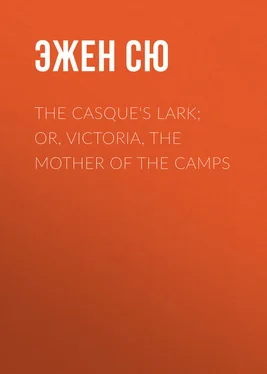Эжен Сю - The Casque's Lark; or, Victoria, the Mother of the Camps
Здесь есть возможность читать онлайн «Эжен Сю - The Casque's Lark; or, Victoria, the Mother of the Camps» — ознакомительный отрывок электронной книги совершенно бесплатно, а после прочтения отрывка купить полную версию. В некоторых случаях можно слушать аудио, скачать через торрент в формате fb2 и присутствует краткое содержание. Издательство: Иностранный паблик, Жанр: literature_19, foreign_antique, foreign_prose, на английском языке. Описание произведения, (предисловие) а так же отзывы посетителей доступны на портале библиотеки ЛибКат.
- Название:The Casque's Lark; or, Victoria, the Mother of the Camps
- Автор:
- Издательство:Иностранный паблик
- Жанр:
- Год:неизвестен
- ISBN:нет данных
- Рейтинг книги:5 / 5. Голосов: 1
-
Избранное:Добавить в избранное
- Отзывы:
-
Ваша оценка:
- 100
- 1
- 2
- 3
- 4
- 5
The Casque's Lark; or, Victoria, the Mother of the Camps: краткое содержание, описание и аннотация
Предлагаем к чтению аннотацию, описание, краткое содержание или предисловие (зависит от того, что написал сам автор книги «The Casque's Lark; or, Victoria, the Mother of the Camps»). Если вы не нашли необходимую информацию о книге — напишите в комментариях, мы постараемся отыскать её.
The Casque's Lark; or, Victoria, the Mother of the Camps — читать онлайн ознакомительный отрывок
Ниже представлен текст книги, разбитый по страницам. Система сохранения места последней прочитанной страницы, позволяет с удобством читать онлайн бесплатно книгу «The Casque's Lark; or, Victoria, the Mother of the Camps», без необходимости каждый раз заново искать на чём Вы остановились. Поставьте закладку, и сможете в любой момент перейти на страницу, на которой закончили чтение.
Интервал:
Закладка:
Eugène Sue
The Casque's Lark; or, Victoria, the Mother of the Camps
INTRODUCTION
I, Schanvoch, a descendant of Joel, the brenn of the tribe of Karnak; I, Schanvoch, now a freeman, thanks to the valor of my father Ralf and the bold Gallic insurrections that continued unabated from century to century; I, Schanvoch, write the following narrative two hundred and sixty-four years after my ancestress Genevieve, the wife of Fergan, witnessed in Judea the death of the poor carpenter Jesus of Nazareth.
I write the following account thirty-four years after Gomer, the son of Judicaël and grandson of Fergan, who was a slave like his father and grandfather, wrote to his son Mederik that he had nothing to add to the family annals but the monotonous account of his life as a slave.
Neither did my ancestor Mederik contribute aught to our family history, and his son Justin contented himself with having a stranger's hand enter these short lines:
"My father Mederik died a slave, fighting as a Son of the Mistletoe for the freedom of Gaul; he told me that he was driven to revolt against the foreign oppression by the narrative of the bravery of our free ancestors and by the description of the sufferance of our enslaved fathers. I, his son Justin, a colonist, and no longer a slave of the fisc, have caused this fact to be entered upon our family parchments, which I shall faithfully transmit to my son Aurel, together with their accompanying emblems, the gold sickle, the little brass bell, the fragment of the iron collar and the little silver cross, all of which I have carefully preserved."
Aurel, Justin's son and a colonist like his father, was not any more literate than the latter, and left no record whatever. After him, again a stranger's hand inserted these lines in our family annals:
"Ralf, the son of Aurel the colonist, fought for the freedom of his country. Ralf having become absolutely free, thanks to the Gallic arms and the holy war preached by our venerable druids, found himself obliged to resort to a friend's help in order to enter the death of his father Aurel upon our family parchments. Happier than myself, my son Schanvoch will not be forced to avail himself of a stranger in order to enter in our family's archives the death of myself, the first male descendant of Joel, the brenn of the tribe of Karnak, who again regained complete freedom. As several of my ancestors have done before me, I here declare that it was the history of our ancestors' valor and martyrdom that induced me to take up arms against the Romans, our masters and secular oppressors."
These family scrolls, together with their accompanying relics, I shall leave to you, my dear little Alguen, the son of my beloved wife Ellen, who gave you birth this day four years ago.
I choose this day, the anniversary of your birth, as a day of happy augury, in order to start, for your benefit and the benefit of our descendants, the narrative of my life and my battles, my joys and my sorrows, obedient to the last wishes of our ancestor Joel, the brenn of the tribe of Karnak.
You will grieve, my son, when you learn from these archives that, from the death of Joel down to that of my great-grandfather Justin, seven generations, aye, seven whole generations, were subjected to intolerable slavery. But your heart will be cheered when you learn that my great-grandfather had, from a slave, become a colonist or serf attached to the glebe of Gaul – still a servile condition but greatly above that of slavery. My own father, having regained his full freedom, thanks to the formidable insurrections of the Sons of the Mistletoe that from century to century were conjured up at the voice of the druids, the tireless and heroic defenders of the freedom of oppressed Gaul, has bequeathed to me freedom, that most precious of all wealth. I shall, in turn, transmit it to you.
By dint of constantly struggling for it, and also of stubborn resistance, we Gauls have succeeded in successively reconquering almost our full former freedom. A last and frail bond still holds us to Rome, now our ally, after having formerly been our pitiless master. When that last and frail bond will be snapped, we shall have regained our absolute independence, and we shall resume our former place at the head of the great nations of the world.
Before acquainting you with the details of my life and time, my son, I must fill certain voids that are left in the history of our family through the omissions of those of our ancestors, who, either through illiteracy or the hardness of the times, were prevented from joining their respective accounts to our archives. Their lives must have been the life of all the other Gauls, who, the fetters of slavery notwithstanding, have, step by step and from century to century, conquered through revolt and battle the deliverance of our country.
You will find in the last lines written by our ancestor Fergan, the husband of Genevieve, that despite the vows taken by the Sons of the Mistletoe and despite innumerable uprisings, one of the most formidable of which was chieftained by Sacrovir, the worthy emulator of the Chief of the Hundred Valleys, the Roman yoke that Caesar imposed upon Gaul remained unshaken. In vain did Jesus, the carpenter of Nazareth, prophesy that the chains of the slave would be broken. The slaves still dragged their blood-stained chains. Nevertheless, our old race, weakened, mutilated, unnerved or corrupted though it was by slavery, never once was submissive, and allowed only short intervals to pass without endeavoring to shake off the yoke. The secret associations of the Sons of the Mistletoe covered the country, and furnished intrepid soldiers to each succeeding revolt against Rome.
After the heroic attempt of Sacrovir, the account of whose sublime death you will find in the narrative of our ancestor Fergan, the weak and timid weaver-slave, other insurrections broke out during the reigns of the Emperors Tiberius and Claudius; they increased in force during the civil wars that rent Italy under the reign of Nero. At about that time, one of our heroes, Vindex, as intrepid a patriot as Sacrovir or the Chief of the Hundred Valleys, long held the Roman arms in check. Civilis, another Gallic patriot, taking his stand upon the prophecies of Velleda – one of our female druids, a virile woman, wise in council and worthy compeer of our brave and wise mothers – roused almost all Gaul to revolt and gave the first serious wound to the power of Rome. Finally, during the reign of the Emperor Vitellius, a poor field slave like our ancestor Guilhern set himself up as the messiah and liberator of Gaul, just as Jesus of Nazareth proclaimed himself the Messiah of Judea, and pursued with patriotic ardor the task of liberation that was started by the Chief of the Hundred Valleys and continued after him by Sacrovir, Vindex, Civilis and so many other heroes. That field slave's name was Marik. He was then barely twenty-five years of age; robust, intelligent and gifted with heroic bravery he joined the Sons of the Mistletoe. Our venerable druids, always persecuted, had traversed Gaul inciting the lukewarm, restraining the impatient, and preparing all for the hour of the insurrection. It broke out. At the head of ten thousand slaves, field laborers like himself and armed with their scythes and forks, Marik engaged the Roman troops of Vitellius under the walls of Lyons. That first attempt miscarried; the insurgents were cut to pieces by the Roman army that greatly exceeded them in numbers. But so far from feeling overwhelmed, this defeat intensified the ardor of the revolted people. Whole populations rose in rebellion at the voice of the druids that called them to the holy war. The combatants seemed to spring out of the entrails of the earth, and Marik saw himself again at the head of a numerous army. Endowed by the gods with a military instinct, he disciplined his troops, inspired them with courage and a blind confidence in him, and marched at their head towards the banks of the Rhine, where, sheltered behind its trenches, lay the reserve of the Roman army. Marik attacked it, beat it, and compelled whole legions that he took prisoner to drop their own ensigns and substitute them with our ancient Gallic cock. Those Roman legions had, due to their long sojourn in our country, virtually become Gauls; carried away by the military ascendency of Marik, they readily joined him, combatted under him against the fresh Roman columns that were sent from Italy, and either annihilated or dispersed them. The hour of Gaul's deliverance was about to sound – but at that moment Marik fell through cowardly treason into the hands of the monster Vespasian, then Emperor of Rome. Riddled with wounds the hero of Gaul was delivered to the wild beasts in the circus, like our own ancestor Sylvest.
Читать дальшеИнтервал:
Закладка:
Похожие книги на «The Casque's Lark; or, Victoria, the Mother of the Camps»
Представляем Вашему вниманию похожие книги на «The Casque's Lark; or, Victoria, the Mother of the Camps» списком для выбора. Мы отобрали схожую по названию и смыслу литературу в надежде предоставить читателям больше вариантов отыскать новые, интересные, ещё непрочитанные произведения.
Обсуждение, отзывы о книге «The Casque's Lark; or, Victoria, the Mother of the Camps» и просто собственные мнения читателей. Оставьте ваши комментарии, напишите, что Вы думаете о произведении, его смысле или главных героях. Укажите что конкретно понравилось, а что нет, и почему Вы так считаете.












